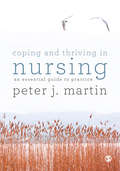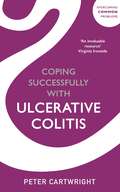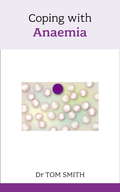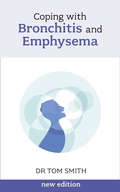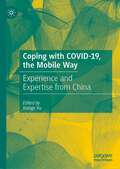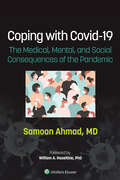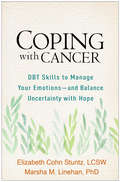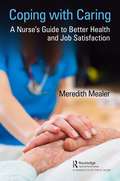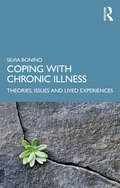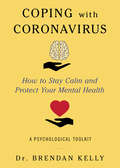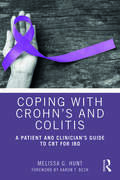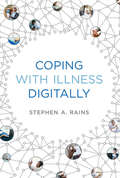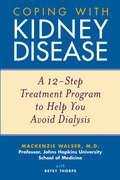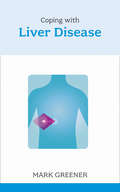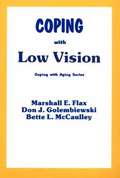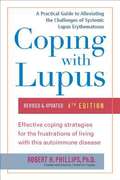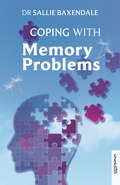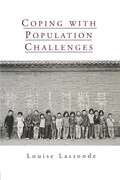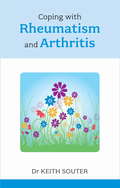- Table View
- List View
Coping and Thriving in Nursing: An Essential Guide for Practice
by Peter MartinA unique guide to coping and thriving in the NHS today. The book is wholly practice-focused, speaking to current standards of care for patients, and current working conditions for staff in the NHS. Written by academics specialising in mental health, nursing and well-being, each chapter provides guidance and support to pre and post-registration nurses to manage and persevere as a nurse today. This essential first edition includes: Case studies Reflective practice Mindfulness exercises
Coping successfully with Ulcerative Colitis
by Peter CartwrightIf you've been diagnosed - or think you might be soon - with ulcerative colitis, you will know that it has symptoms which can be painful, disruptive and frequently embarrassing. Although a common condition, it is one not often talked about, which makes the practical advice given in this handbook even more indispensable.In Coping Successfully with Ulcerative Colitis, Peter Cartwright offers clear, accessible information about the condition. He outlines the causes and explains which diagnostic tests are necessary and what treatments are available. The book also gives helpful strategies for self-management through diet and other lifestyle changes. Should surgery become necessary, there is step-by-step guidance on to what to expect, both during a hospital stay and afterwards, and reassuring insights on adjusting to a stoma.This practical, readable and clinically comprehensive book will reassure you or your loved one, offering an opportunity to live life to the full, free from the limitations imposed by ulcerative colitis.
Coping with Anaemia
by Tom SmithAnaemia, or lack of red blood cells, is common, and can be a symptom of a serious underlying disorder. It has a number of causes, and this book stresses that it's vital to find and treat these, rather than simply prescribing iron tablets. Iron tablets do have their place in treatment, but this is rarely the full answer and priority must be given to discovering the underlying cause.
Coping with Anaemia
by Tom SmithAnaemia, or lack of red blood cells, is common, and can be a symptom of a serious underlying disorder. It has a number of causes, and this book stresses that it's vital to find and treat these, rather than simply prescribing iron tablets. Iron tablets do have their place in treatment, but this is rarely the full answer and priority must be given to discovering the underlying cause.
Coping with Bronchitis and Emphysema
by Tom SmithBronchitis and emphysema affect some three million people in the U.K. and kill 30,000 people each year. They account for more loss of time from work than any other form of illness, and are usually caused by smoking, which leads to inflammation of the bronchi. As the lungs become increasingly damaged, shortness of breath develops even on moderate exertion, such as climbing stairs. As the condition worsens, simple tasks such as washing or shaving cause marked shortness of breath, and eventually fighting for breath occurs even at rest. The condition cannot be cured. However, further deterioration can be prevented, and this new edition brings us up to date with changes in treatment, though stopping smoking is still key. Difficulty in breathing can be eased by using inhalers or nebulisers which deliver drugs that open up the airways called bronchodilators (eg 'Ventolin'). Inhaled steroids (eg 'Becotide') are useful in reducing inflammation of the air tubes. Many people need to have oxygen several times a day, and dust, fumes and pollution should be avoided. Lifestyle changes may also help, such as losing weight and taking exercise.
Coping with Bronchitis and Emphysema
by Tom SmithBronchitis and emphysema affect some three million people in the U.K. and kill 30,000 people each year. They account for more loss of time from work than any other form of illness, and are usually caused by smoking, which leads to inflammation of the bronchi. As the lungs become increasingly damaged, shortness of breath develops even on moderate exertion, such as climbing stairs. As the condition worsens, simple tasks such as washing or shaving cause marked shortness of breath, and eventually fighting for breath occurs even at rest. The condition cannot be cured. However, further deterioration can be prevented, and this new edition brings us up to date with changes in treatment, though stopping smoking is still key. Difficulty in breathing can be eased by using inhalers or nebulisers which deliver drugs that open up the airways called bronchodilators (eg 'Ventolin'). Inhaled steroids (eg 'Becotide') are useful in reducing inflammation of the air tubes. Many people need to have oxygen several times a day, and dust, fumes and pollution should be avoided. Lifestyle changes may also help, such as losing weight and taking exercise.
Coping with COVID-19, the Mobile Way: Experience and Expertise from China
by Xiaoge XuThis edited book examines the impact of COVID-19 on selected areas of mobile studies, ranging from mobile public spaces to mobile workspaces. This book offers insights into how to leverage mobile devices, as well as features and communication to contain the pandemic. Specifically, it highlights the Chinese experience and lessons, and the country’s expertise in social capital management during the health crisis, governance of information flow and order, combating fake news and the infodemic, documenting the pandemic, and lessons learned from mobile health communication. It also discusses how small companies can survive the death of foreign trade during the pandemic. Looking beyond the pandemic, the book also explores the challenges and opportunities posed by the pandemic by investigating mobile learning, mobile journalism, mobile marketing and mobile workspaces. Given its scope, this book will enhance the global efforts in fighting the pandemic and contribute to the current body of knowledge on how to leverage mobile technologies to enhance public health communication during public health crises.
Coping with COVID-19: The Medical, Mental, and Social Consequences of the Pandemic
by Samoon AhmadCoping with COVID-19: The Medical, Mental, and Social Consequences of the Pandemic provides readers with unique and timely insights about the single most disruptive and epoch-defining public health event of the last 100 years. Written in an easy-to-read and accessible style, widely respected psychiatrist and author Dr. Samoon Ahmad explores both the science of the virus and the lasting psychological, clinical, and professional implications of the pandemic in two well-organized parts. The first part of the book examines the historical precedents of pandemics, as well as the virology and symptomology of SARS-CoV-2. The second part covers the broader effects of the pandemic on society with special consideration being given to its impact on public health policy, the medical industry, and the individual psychology of children and adults.
Coping with Cancer: DBT Skills to Manage Your Emotions--and Balance Uncertainty with Hope
by Marsha M. Linehan Elizabeth Cohn StuntzThis compassionate book presents dialectical behavior therapy (DBT), a proven psychological intervention that Marsha M. Linehan developed specifically for the impossible situations of life--and which she and Elizabeth Cohn Stuntz now apply to the unique challenges of cancer for the first time. *How can you face the fear, sadness, and anger without being paralyzed by them? *Is it possible to hold on to hope without being in denial? *How can you nurture supportive relationships when you have barely enough energy to take care of yourself? Learn powerful DBT skills that can help you make difficult treatment decisions, manage overwhelming emotions, speak up for your needs, and tolerate distress. The stories and collective wisdom of other cancer patients and survivors illustrate the coping skills and show how you can live meaningfully, even during the darkest days.
Coping with Caring: A Nurse's Guide to Better Health and Job Satisfaction
by Meredith MealerNurses typically go in to the profession of nursing because they want to "care" for patients, not knowing that the inherent stresses of the work environment put them at risk for developing psychological disorders such as burnout syndrome, posttraumatic stress disorder (PTSD), anxiety and depression. Symptoms of these disorders are often debilitating and affect the nurse’s functioning on both a personal and professional level. While environmental and/or organizational strategies are important to help combat stress, oftentimes the triggers experienced by nurses are non-modifiable including patient deaths, prolonging life in futile conditions, delivering post-mortem care and the feeling of contributing to a patient’s pain and suffering. It is paramount that nurses enhance their ability to adapt to their work environment. Resilience is a multidimensional psychological characteristic that enables one to thrive in the face of adversity and bounce back from hardships and trauma. Importantly, resilience can be learned. Factors that promote resilience include attention to physical well-being and development of adaptive coping skills. This book provides the nurse, and the administrators who manage them, with an overview of the psychological disorders that are prevalent in their profession, first-person narratives from nurses who share traumatic and/or stressful situations that have impacted their career and provide detailed descriptions of promising coping strategies that can be used to mitigate symptoms of distress.
Coping with Chronic Illness: Theories, Issues and Lived Experiences
by Silvia BoninoThis valuable book combines psychological theories of health with the lived experience of coping with chronic health conditions, focusing on the "ill person" as an actor of their own development. It draws on perspectives from developmental and health psychology alongside the author’s personal experience of chronic illness. Bonino considers all aspects of living with illness, from issues that impact on everyday functioning such as pain and fatigue, to the rebuilding of identity through meaningful new goals and effective actions, and the development of therapeutic relationships. Psychological theories are interweaved with descriptions of lived encounters to center the experience of the person living alongside illness and provide insightful points of reference that everyone could try to use when facing the challenges of chronic disease in the course of their daily lives. Coping with Chronic Illness is important reading for those living with chronic health conditions, as well as for healthcare professionals looking to gain awareness of the psychological issues caused by living with illness. It is also of interest for postgraduate students of health psychology.
Coping with Coronavirus: How to Stay Calm and Protect Your Mental Health: A Psychological Toolkit
by Brendan KellyHow worried should I be? What information can I trust? What should I tell the children? Can I survive the panic, let alone the virus? These are certainly challenging, unprecedented times. Allow pre-eminent psychiatrist Dr. Brendan Kelly to help you understand and cope with the unique stresses of today, as we all try to deal with the threat of COVID-19 within our homes, communities and throughout the world. The anxiety associated with the coronavirus crisis is different to the anxiety seen in traditional disorders, because demonstrably there is something to fear, and that&’s what makes this worry so ubiquitous, so persistent and so challenging to manage. The good news is that, just as we are capable of finding sophisticated ways to make ourselves more anxious, we are equally good at finding sophisticated ways to manage our mental health, once we put our minds to it. Anxiety-management techniques help hugely once they are modified to suit the new situation we face, and in Coping with Coronavirus, Dr Brendan Kelly will give you all the practical tools you and your family need to navigate these dark, uncertain days. Both the author and the publisher are donating their proceeds from this book to charity.
Coping with Crohn’s and Colitis: A Patient and Clinician’s Guide to CBT for IBD
by Melissa G. HuntThis practical guide provides patients who have inflammatory bowel disease (IBD) with cognitive-behavioral therapy (CBT) strategies for coping with IBD. It teaches a number of skills that can make coping with Crohn’s or colitis easier. Chapters provide an overview of Crohn’s and colitis as well as the interplay between stress and the gut, before offering strategies on relaxation training, physical activity, managing stress and avoidance, diet and nutrition, and medical treatment options. The book also emphasizes the importance of the doctor-patient relationship and helps patients learn how to think about medical management (including the possibility of surgery) to minimize anxiety from catastrophic thoughts and balance potential risks and benefits appropriately. Dr. Hunt challenges readers to engage in specific behavioral experiments to reduce shame and stigma and highlights practical applications with case illustrations and clinical vignettes. This book can be used as a standalone self-help book or in conjunction with practitioners during in-person therapy.
Coping with Endometriosis
by Glenda Motta Robert H. PhillipsSound, Compassionate Advice for Alleviating the Physical and Emotional Symptoms of This Frequently Misunderstood Illness
Coping with Illness Digitally
by Stephen A. RainsAn examination of “digital coping” involving the use of communication technologies, particularly social media, in responding to illness. Communication technologies have become a valuable resource for responding to the profound challenges posed by illness. Medical websites make it possible to find information about specific health conditions, e-mail provides a means to communicate with health care providers, social network sites can be used to solidify existing relationships, online communities provide opportunities for expanding support networks, and blogs offer a forum for articulating illness-related experiences. In this book, Stephen Rains examines this kind of “digital coping” involving the use of communication technologies, particularly social media, in responding to illness. Synthesizing a diverse body of existing empirical research, Rains offers the first book-length exploration of what it means to cope with illness digitally. Rains examines the implications of digital communication technologies on a series of specific challenges raised by illness and discusses the unique affordances of these technologies as coping resources. He considers patients' motivations for forging relationships online and the structure of those networks; the exchange of social support and the outcomes of sharing illness experiences; online health information searches by patients and surrogates; the effects of Internet use on patient-provider communication; and digital coping mechanisms for end-of-life and bereavement, including telehospice, social media memorials, and online grief support. Finally, Rains presents an original model of digital coping that builds on issues discussed to summarize how and with what effects patients use communication technologies to cope with illness.
Coping with Kidney Disease: A 12-Step Treatment Program to Help You Avoid Dialysis
by Betsy Thorpe Mackenzie WalserA revolutionary program that can indefinitely postpone the need for dialysis If you've been diagnosed with kidney failure, this book could save your life. If you suffer from diabetes, hypertension, obesity, or any of a host of conditions that put you at risk for kidney disease, you owe it to yourself to read what is in this book. If you are among the 60,000 North Americans who go on dialysis each year, the information in this book could substantially improve your quality of life. In Coping with Kidney Disease, a leading expert tells you, in plain English, what you need to know to: * Understand kidney failure * Recognize early warning signs of kidney failure * Get a proper diagnosis * Talk with your doctors about it * Confidently evaluate treatment options * Take charge of your treatment * Delay dialysis or even avoid the need for it altogether The centerpiece of Coping with Kidney Disease is Dr. Walser's revolutionary 12-step program for avoiding dialysis. Based on treatments he has pioneered with his own patients at the Johns Hopkins University School of Medicine, the program calls for a supplemented low-protein diet supported by treatments to control blood pressure and correct high cholesterol. So effective has this breakthrough strategy proven to be that in many patients it actually worked to slow or arrest the progression of kidney failure to the end stage. Knowledge is power. Coping with Kidney Disease empowers you with what you need to take charge of kidney disease.
Coping with Liver Disease
by Mark GreenerLiver disease is the leading cause of death after heart, cancer, stroke and respiratory disease, and kills more people than diabetes and road deaths combined. But, there is hope. The liver is a uniquely regenerative organ, and some European countries have dramatically cut liver disease in recent years. This book looks at lifestyle factors and medical interventions that can help. Topics include: About the liver and gall bladder; Types of liver disease including hepatitis, cirrhosis, non-alcoholic fatty liver disease (NAFL) and hepatitis; Tests and checks; Treatment including medication; Diet; Alcohol; 'Cleansing' the liver; Obesity and other lifestyle considerations; Coping with increased vulnerability to infections.
Coping with Liver Disease
by Mark GreenerLiver disease is the leading cause of death after heart, cancer, stroke and respiratory disease, and kills more people than diabetes and road deaths combined. But, there is hope. The liver is a uniquely regenerative organ, and some European countries have dramatically cut liver disease in recent years. This book looks at lifestyle factors and medical interventions that can help. Topics include: About the liver and gall bladder; Types of liver disease including hepatitis, cirrhosis, non-alcoholic fatty liver disease (NAFL) and hepatitis; Tests and checks; Treatment including medication; Diet; Alcohol; 'Cleansing' the liver; Obesity and other lifestyle considerations; Coping with increased vulnerability to infections.
Coping with Low Vision (Coping with Aging)
by Bette L. Mccaulley Don J. Golembiewski Marshall E. Flax"The books in the Coping with Aging Series are written for men and women coping with the challenges of aging, and for their families and other caregivers. The authors are all experienced practitioners: doctors, nurses, social workers, psychologists, pharmacists, nutritionists, audiologists, physical and occupational therapists, and speech-language pathologists."
Coping with Lupus, 4th Edition
by Robert H. PhillipsA completely updated and revised edition that provides comfort, information, strategies, and advice for those living with lupus. There is no cure for lupus, so a diagnosis of this potentially debilitating autoimmune disorder is understandably disquieting. This new edition of Coping with Lupus answers all the important questions one might have and offers practical coping strategies to help those with lupus live their lives to the fullest.Dr. Robert Phillips, the founder and director of the Center for Coping, lends his expertise in dealing with the psychological aspects of chronic health problems to address a range of issues, including: The medical facts-what lupus is, and how it is diagnosed and treated Medications, nonmedical pain-control methods, exercise, and diet Lifestyle changes to maintain optimal physical and emotional health Coping strategies for virtually every facet of living with lupus
Coping with Memory Problems
by Sallie BaxendaleA Books on Prescription/Reading Well titleDo you, or does someone you know, struggle to remember things? For every person who develops Alzheimer's, there are thought to be at least another eight whose memory problems are severe enough to affect the quality of their lives.Written by an award-winning neuropsychologist, Coping with Memory Problems has been written to help you, or the person you are caring for, cope with memory difficulties. It explains how memory works and describes strategies you can use to boost your brain. It also looks at the most common causes of memory problems and shows you how to seek further help for something that might be more than just age-related decline.Although there is no miracle solution, using the strategies outlined in this book will go a long way to reducing the annoyance that memory problems can cause in daily life, and thus to restoring your equilibrium and wellbeing.
Coping with Memory Problems
by Sallie BaxendaleA Books on Prescription/Reading Well titleDo you, or does someone you know, struggle to remember things? For every person who develops Alzheimer's, there are thought to be at least another eight whose memory problems are severe enough to affect the quality of their lives.Written by an award-winning neuropsychologist, Coping with Memory Problems has been written to help you, or the person you are caring for, cope with memory difficulties. It explains how memory works and describes strategies you can use to boost your brain. It also looks at the most common causes of memory problems and shows you how to seek further help for something that might be more than just age-related decline.Although there is no miracle solution, using the strategies outlined in this book will go a long way to reducing the annoyance that memory problems can cause in daily life, and thus to restoring your equilibrium and wellbeing.
Coping with Population Challenges (Health And Population Set Ser.)
by Louise LassondeDespite rapidly decreasing rates of population growth caused by reduced fertility in the majority of world regions, demographers are predicting that the world's population will still double by the year 2050. The question is therefore no longer the traditional one of whether the planet can support so many people, but how to provide a sustainable future for ten billion individuals. Quantitative problems have become ethical ones. Coping with Population Challenges addresses these issues in the context of international debate and agreements since the first World Population Plan of Action in 1974 to the 20-year Programme of Action adopted at the International Conference on Population and Development in Cairo in 1994. The author describes how the Programme of Action focalizes on women's issues, reproductive choice and the notion of the individual. However, she identifies a number of important but neglected areas of the debate that the Programme failed to address and brings to light some of the inconsistencies that need to be resolved if the Programme is to be implemented. The author also looks at the underlying ethical dimension of all choices relating to the population issue and suggests measures and machinery for giving effect to states' commitments, including reformulating problems and defining the appropriate economic framework for solutions. The book is an excellent introduction for the non-specialist to a very topical debate, and a useful reference for researchers. LOUISE LASSONDE is director of the Fondation du Devenir, Geneva. In her capacity as anthropologist and demographer, Dr Lassondc has worked closely with the United Nations and non-governmental organizations in many countries. Originally published in 1997
Coping with Rheumatism and Arthritis
by Keith SouterMore than 10 million people in the UK have arthritis and rheumatism, and the number seems to be increasing year by year. About 20 per cent of all doctor visits are for these and related musculoskeletal conditions, making this the largest group of patients attending surgeries. Although these disorders are not in themselves a major cause of death, they are the largest cause of pain and disability. Over three million adults are physically disabled because of such problems. Arthritis and rheumatism are blanket terms that cover many different conditions. Osteoarthritis is the most common form of arthritis; currently affecting more than eight million people in the UK. In addition, there are about a million people with rheumatoid arthritis. Fibromyalgia is even more common than rheumatoid arthritis. People of all ages can be affected - e.g some 15,000 children are affected by juvenile arthritis. While there is much the doctor can do, this book looks at how to help yourself. One of the main themes of this book is what the author calls the Life Cycle, which demonstrates how aspects of a person's life interact to influence their condition including body, emotions, mind and lifestyle.
Coping with Rheumatism and Arthritis: Tried And Tested Self-help Advice
by Keith SouterMore than 10 million people in the UK have arthritis and rheumatism, and the number seems to be increasing year by year. About 20 per cent of all doctor visits are for these and related musculoskeletal conditions, making this the largest group of patients attending surgeries. Although these disorders are not in themselves a major cause of death, they are the largest cause of pain and disability. Over three million adults are physically disabled because of such problems. Arthritis and rheumatism are blanket terms that cover many different conditions. Osteoarthritis is the most common form of arthritis; currently affecting more than eight million people in the UK. In addition, there are about a million people with rheumatoid arthritis. Fibromyalgia is even more common than rheumatoid arthritis. People of all ages can be affected - e.g some 15,000 children are affected by juvenile arthritis. While there is much the doctor can do, this book looks at how to help yourself. One of the main themes of this book is what the author calls the Life Cycle, which demonstrates how aspects of a person's life interact to influence their condition including body, emotions, mind and lifestyle.
